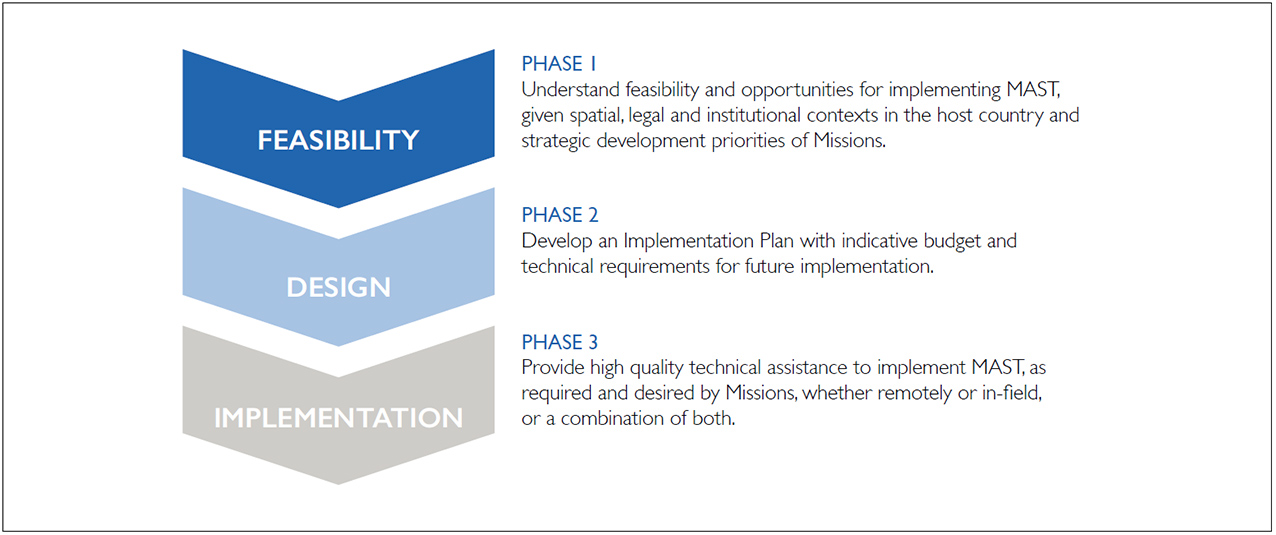USAID’s Mobile Application to Secure Tenure (MAST) combines innovative and transformative technologies with an inclusive participatory approach and delivery method to address challenges related to securing property rights in rural and urban areas, clarifying land resources and removing barriers to economic development for people, businesses, and communities. The newly updated MAST version of MAST expands and builds on a proven track record of delivering results in Burkina Faso, Tanzania, and Zambia.
USAID’s Land Technology Solutions (LTS) project, which manages the development and expansions of MAST, provides a suite of integrated support services to USAID Missions that are interested in using this technology to achieve host country strategic development objectives, including those outlined in the Global Food Security Strategy, the USAID Gender Equality and Women’s Empowerment Policy, and the USAID Biodiversity Policy.
What is MAST?
MAST is a flexible suite of tools paired with inclusive training and approaches that use mobile phones and tablets to efficiently, transparently, and affordably map and document land and resource rights. MAST can help people and communities define, record, and register local
land and resource boundaries. It also captures important information, such as the names and photographs of individuals and groups who use the land and information about how they use it. MAST, a fit for purpose tool, combines an easy-to-use mobile phone application with a participatory approach that empowers women and men in the process of understanding, mapping, and registering their own rights and resources.
The MAST application supports the collection and management of land and resource rights information, including a mobile application to capture land rights information in the field and a back-end land rights data management application with tools to manage and administer land information. MAST Mobile can be used on any Android mobile device.
How Does LTS Support the Use of MAST?
The LTS project can support missions with a flexible, phased technical assistance approach that provides fit-for-purpose solutions based on the unique requirements and demands of each context.
LTS’s paramount goal is helping USAID meet its priorities and development objectives.
LTS: An Inclusive, Integrated Approach
LTS begins its engagement by conducting a feasibility assessment to better understand how MAST might help a mission more efficiently achieve its goals. MAST can add value to a wide variety of projects, including those working to achieve broader development outcomes such as promoting gender equality and women’s empowerment, initiating and helping to build inclusive and sustainable markets, stimulating agricultural-led economic growth, supporting democracy and governance, and increasing resilience.
LTS’s initial assessment, which includes desk research and a stakeholder landscape assessment, will result in a report that systematically determines the feasibility and need for MAST and will outline how MAST might be implemented, whether it should be integrated into an existing or planned Mission project or become a stand-alone pilot initiative. Following the feasibility study, LTS conducts site visits to develop an implementation plan and budget. Toward this end, LTS solicits extensive stakeholder engagement to ensure that the project design and scale is informed by feedback, evidence, and requirements from the field. LTS ensures that the potential project activities are validated by all stakeholders.
Finally, LTS will ensure effective communication protocols during implementation and support partners and staff through training. Implementation oversight, whether direct or remote, will be focused on working collaboratively with partners and host governments to effectively implement and monitor project activities.
CONTACT US
For more information on accessing LTS Services, please contact Ioana Bouvier, USAID E3/Land and Urban Senior Geospatial Analyst at ibouvier@usaid.gov
or Stephen Brooks, Senior Land and Resource Governance Advisor at sbrooks@usaid.gov.
More information about MAST can be found at www.land-links.org/MAST.



